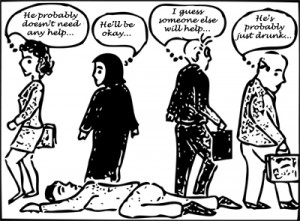Have you ever read something in a group message like “Hey, can someone come get me from the airport?” and think “Eh, someone else will do it, I just won’t respond.” ? Then you may be guilty of the bystander effect. The bystander effect, otherwise known as “bystander apathy” happens when people believe there is no tendency for them to get involved in a social or emergency situation because they believe someone else will help (mostly in a crowd). Therefore, when there is more people, less people are likely to help out the victim. Going back to my example above, the person believes that since they are in a group message with other individuals, that someone else will pick up the duty to go pick up the friend. If all of the individuals have the same thought, the person at the airport will be sitting there stranded for a little. As surprising as it is, this happens a lot in emergency situations such as car accidents or lost children on the street. So, what exactly are some examples of the psychological phenomenon the bystander effect?
Bystander Effect Psychology Social Experiment
I found a video of an experiment where an actor pretended to be sick, grasping his stomach on the ground. He is groaning and wincing but people simply look down at him and walk along. He even blatantly calls for help, “help me, please help me sir” and the man just looks at him, and walks away. This went on for a good 20 minutes and no one even hesitated to speak or help him. He was then replaced with a women of the same age. 4 minutes passed and still none of the 34 people who had passed her even thought to ask what is wrong. A man finally walks up to her and asks if she is okay, along with another woman who comes to check on her simply because the man is there as well. I thought this was very interesting because the woman who finally helped the “sick” woman out only did so once the man came to check on her. Otherwise, she would have obviously went on with her day with no responsibility in mind. Also, I was wondering if she got helped sooner, -around 5 minutes rather than the man’s 20+ minutes- simply because she was a woman. The video did not mention this, but I am sure that can be something to look into. The experiment went on to have the same man in the beginning but this time, in business apparel. Shockingly, only 6 seconds had passed and someone asked if he was okay, and suddenly a swarm of people surrounded him. I was extremely curious why our brains work the way they do and want to search for an explanation of this phenomenon.
Potential Explanations
- Pluralistic Ignorance
One of the more common thoughts on why we as humans fail to help during certain situations is pluralistic ignorance. This occurs when the individual walking or driving by does not even realize that someone is in need of help. Therefore, if we see something and are not positive of what is happening, we look at other people’s reactions and body language to determine if we should intervene or not. The problem with this is, if no one else is getting involved we assume everything is okay, despite the fact that there may be a really bad emergency happening. Basically the thought behind this is that we think everyone else is interpreting the situation in some way but they actually aren’t as explained beautifully by psychrod.
- Diffusion of Responsibility
The other possible explanation for the bystander effect is the diffusion of responsibility. This goes perfectly with the social experiment I mentioned above. People do not feel responsible for the situation because they feel as though someone else may do it, resulting in that person not being helped at all. The more people around, the less likely it is for that person to be saved.
What to take from this
As strange as it is, the bystander effect is an interesting phenomenon. Whether it be unintentional or not, (Pluralistic Ignorance versus Diffusion of Responsibility) keep in mind, whenever you have that gut feeling that something is wrong, please go out there and try to help because it may save a life. Just because everyone else is ignoring it does not mean that person is okay.
Works Cited
“The Bystander Effect: Reactions and Causes – PSYCHROD.” PSYCHROD. N.p., 30 Jan. 2015. Web. 29 Nov. 2016. <http://psychrod.com/the-bystander-effect/>.
Coolpsychologist. “THE BYSTANDER EFFECT.” YouTube. YouTube, 09 June 2009. Web. 29 Nov. 2016. <https://www.youtube.com/watch?v=OSsPfbup0ac>.
Https://www.facebook.com/verywell. “What Is the Bystander Effect?” Verywell. N.p., n.d. Web. 29 Nov. 2016. <https://www.verywell.com/the-bystander-effect-2795899>.
@PsychToday. “Why Don’t We Help? Less Is More, at Least When It Comes to Bystanders.” Psychology Today. N.p., n.d. Web. 29 Nov. 2016. <https://www.psychologytoday.com/blog/the-social-thinker/200911/why-don-t-we-help-less-is-more-least-when-it-comes-bystanders>.
Picture
http://3.bp.blogspot.com/-Vj1_8pSK7NY/UWQxD0cwJsI/AAAAAAAAAd0/MD9ALo-55Lo/s1600/bystandereffect.jpg

